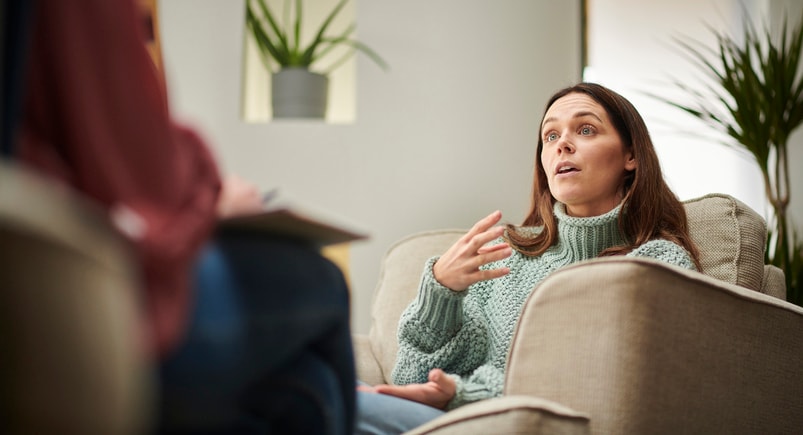When it comes to raising children in a two-parent household, you’re (likely) part of a united front. Meeting at work running late, leaving partner #1 unable to scoop up a little one from soccer practice? No problem — partner #2’s got it covered. Is a tween begging for concert tickets with a potentially unruly, dangerous crowd? Partner #1 — perhaps the parent with stronger debate skills — can provide the gentle (but firm) letdown that partner #2 might struggle to communicate.
Single parenthood is a whole other story, points out Laurie Singer, a licensed marriage and family therapist and board-certified behavior analyst. She notes that single parents tend to assume all caregiving roles — the disciplinarian, the tutor, the protector, the chef, the cab driver, the buddy — which can lead to frustration and burnout.
Doubling up on caregiving duties isn’t the only obstacle that single parents face. The American Psychological Association notes that visitation and custody issues, financial woes and ripple effects stemming from divorce or a breakup (say, tension when a single parent starts dating) can add stress. Research published in The Family Journal found that single parents — mothers in particular — are more at risk for psychological stress than married individuals.
The good news? Even as a single parent, you’re not in this alone. You can opt for therapy, according to Traci S. Williams, a clinical psychologist who treats families. “Having a therapist provides an outlet for parents to discuss the difficulties they face,” she notes. “A therapist is an unbiased sounding board who can provide guidance that parents might not get from simply talking with family members or friends.”
Here, experts unpack the top benefits associated with therapy for single parents, plus, how to find (and make time for) the right counselor.
4 benefits of therapy for single parents
From dedicating time to showing up for yourself to working through complex situations that arise, here are several of the top perks of working with a therapist as a single parent.
1. You can’t show up for your kids as a single parent until you show up for yourself.
You know those short safety videos that airplanes stream before takeoff, instructing you to fasten your oxygen mask before helping others (especially little ones)? That same logic applies to parenting, too.
Though therapy might seem like an especially self-serving thing to do, the opposite is true, according to Williams: “A parent’s well-being directly impacts the well-being of their kids,” she notes, adding that parents who abuse substances or show signs of depression or anxiety are more likely to have kids with those same issues, too. (Research from Frontiers in Public Health also backs this up!)
“The single parent may have unresolved issues regarding their own childhood or raising a child, which might be getting in the way of healthy parenting,” Singer adds. “So, by creating an environment [in therapy] where the parent can be heard, and can honestly speak to any past or present issues, they’re often more open-minded to changing their current parenting styles.”
For Jasmine Peterson, a Texas-based personal trainer, writer and single mom, therapy was key in combating this. “Therapy made me understand the issues I was having as a single parent,” Peterson explains. “I was taught how to find solutions and improve my problem-solving skills, boosting my confidence in myself and my kid.”
2. You have a safe space to unpack — and regulate — some pretty complex, confusing emotions.
There’s one major (and oftentimes destructive) emotion many of her single-parent clients face — and have trouble vocalizing: guilt, notes Singer. “Guilt is the emotion that gets in the way of implementing some effective strategies,” she explains. “The underlying guilt of being in a one-parent household can sometimes hinder the decision-making process. This is why it’s important to have a good working relationship with the therapist and have trust that they are working to help the family.”
Guilt isn’t the only emotion a therapist can help single parents sort through. Therapy can (and should) act as an unbiased sounding board, according to Williams. In other words, no matter what less-than-optimistic emotion you’re feeling — anger, resentment, boredom, annoyance — it can be sorted through.
“I went through therapy because I was facing problems navigating the challenges of single parenting and was looking for support to manage my emotions and find coping strategies that could benefit me,” Peterson explains. “The therapy allowed me to express and deal with my emotions. It made me know the reasons behind my emotional struggles while developing ways to handle them.” For example, whenever her anger spiked in a parenting situation, her therapist instructed her to engage in deep breathing.
“Setting boundaries can be difficult for a single parent. Having a therapist work with a parent can help them learn that it’s not only OK to set limits and boundaries.”
—Laurie Singer, a licensed marriage and family therapist and board-certified behavior analyst
3. Therapy helps single parents better set boundaries.
As a single parent — the primary provider for a little life — you might feel like you should be accessible at all times (say, when your kid whines for attention when you’re working or in the case that you should receive an email from their teacher).
Research published in Couple Family Psychology found that constant, relentless accessibility is inherently toxic (and can contribute to family problems). Essentially, your push to “do it all” could backfire if you’re too dead-set on it. Singer says it’s something therapy can help single parents better sort through.
“Setting boundaries can be difficult for a single parent,” she explains. “Having a therapist work with a parent can help them learn that it’s not only OK to set limits and boundaries with their child or children, particularly for those with kids who continue to push for things they want, but setting limits is something that children really need.”
Basically, pushing back might feel tough in the moment, especially with a little one who might not understand why you’re approaching conflict the way you do, but it’s important, Singer says.
4. A therapist can help you approach a complex situation with a cohesive strategy.
In the event you’re divvying up custody, therapy can be beneficial, Singer says. That’s because divorced or separated parents might have differing ideas on parenting styles (or simply parent in two dissimilar environments), which can cause stress and friction.
“When it comes to two-parent families, being on the same page is the key to successful parenting,” says Singer. “But this can be difficult for a single parent if the couple is divorced or no longer living together. Most single parents have a great deal on their plate, and without a counter-balance, can lead to them having a difficult time being objective about their parenting style. A therapist can work with a single-parent family either together, separately, or with one parent.”
How to find a therapist as a single parent
Listen — we get it. Finding a mental health pro who can help you navigate single parenting isn’t the easiest feat. Here, the experts we talked to offer tips for meeting a mental health care provider who’s a match.
1. Get referrals from friends, family or coworkers in similar situations.
One big tip? Get therapist names and numbers from people who you know in similar situations.
Don’t know another single parent directly, or are not entirely comfortable asking someone you do know? That’s where an online group can help. You can find local meetup groups via MeetUp, Facebook or even through professional databases like Psychology Today.
2. Ask the right questions beforehand.
Once you have a few potential therapist options in mind, Singer recommends scanning their website to ensure they’re trained in parenting, families and children.
A call can also help, Singer adds. “It’s always wise to have a phone consultation with the therapist first. This is the time when the parent will want to ask specific questions that are important to them, which a good therapist will welcome.” Though Singer says she never charges for a 15-minute consultation, some therapists might. “If I don’t think the client would be a good fit for me, I try to recommend them to colleagues whose work I’m familiar with. The goal is always to try and facilitate the best possible outcome.”
While everyone’s needs and solutions will differ, Singer notes that it might be wise to gauge how long you’ll see your therapist. The amount of time you spend in therapy really depends on the situation — maybe you’re going through a particularly rough custody battle and could use some temporary help. Or, perhaps you could use ongoing support. Bottom line: Be sure to clarify what your goals are with therapy (aka what would you like to get out of each session) before jumping right in, the experts we interviewed agreed.
“A parent’s well-being directly impacts the well-being of their kids.”
—Traci S. Williams, a clinical psychologist
3. Treat your therapy sessions like an immovable commitment.
As you likely already know too well, making time for yourself as a single parent can be challenging. As tough as it is, though, there’s a big case to be made for ongoing mental health support, as the experts we interviewed agreed.
For instance, although being a working single parent made it challenging to go to therapy, once Peterson realized how critical it was for her family she knew she needed to commit to regular sessions. “I decided that it’s a must to care for my mental well-being,” she notes. “I attended sessions after finishing work and even on the weekends. Also, I hired a babysitter to have some additional free time for sessions. I focused on sticking to the schedule, making therapy an essential part of my life.”
Speaking of sessions, Singer recommends weekly meet-ups with a therapist. While she says an initial session or two in person is always a good idea, you can move to virtual sessions for convenience.
If money, rather than time, is your barrier, check in with your employer (if you have one). Many offer Employee Assistance Programs, or EAPs, which provide free mental counseling services. Williams is also a fan of Open Path Psychotherapy Collective, which is a nonprofit that helps provide mental health care at a reduced rate.
The bottom line on going to therapy as a single parent
When you decide to go to therapy as a single parent, you’re not just helping yourself — you’re simultaneously helping your family’s health, too. “A good therapist will help a single parent put things in perspective, normalize what they’re going through, provide positive feedback and really listen to what [you] have to say,” Singer says. “Therapists can also look at the family situation objectively, which is key in helping the parent look at their decision-making choices.”





